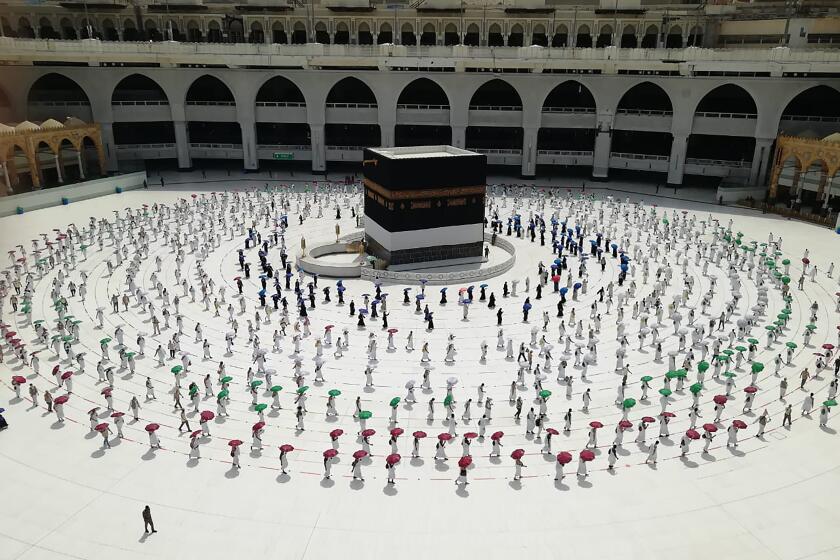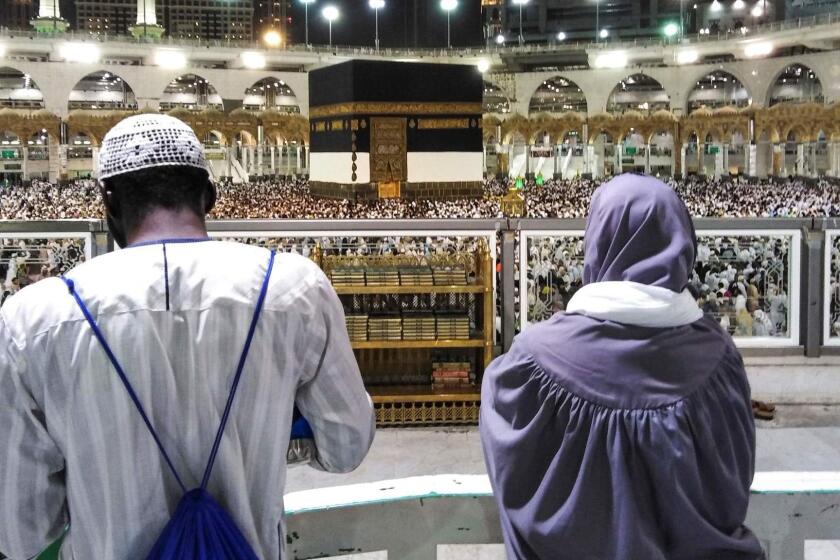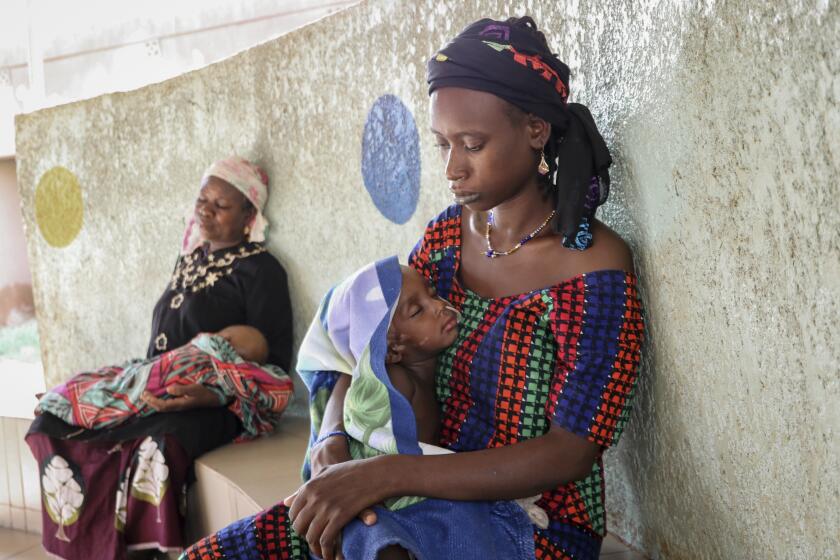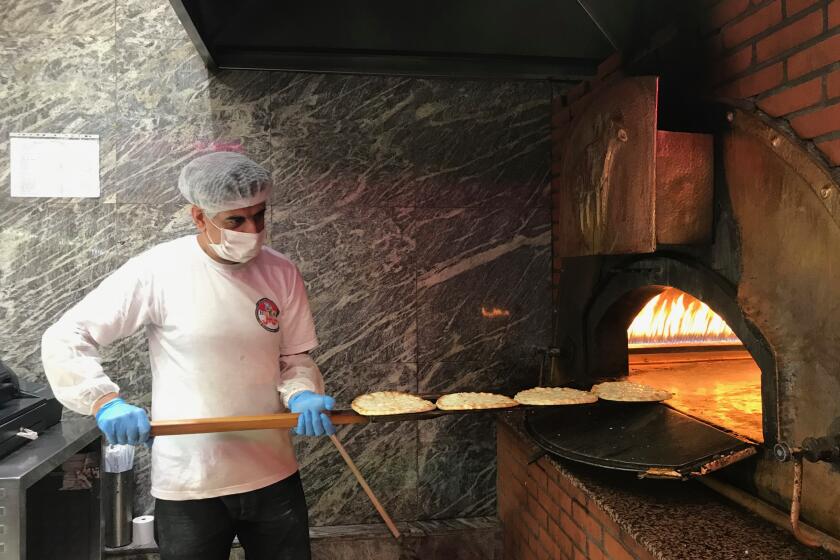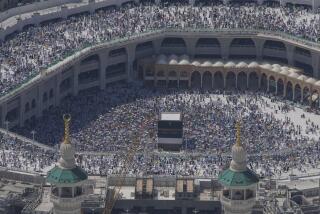Muslims begin celebrating an Eid al-Adha made somber by coronavirus
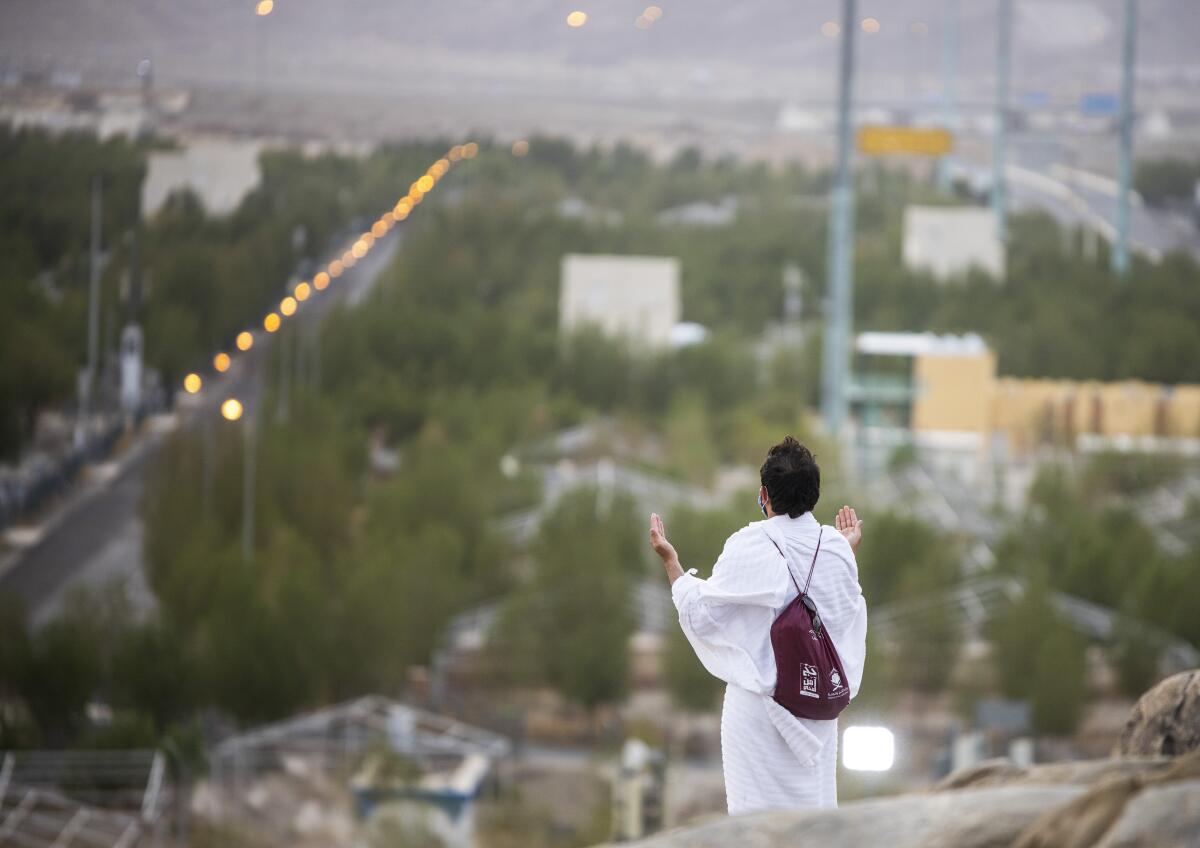
- Share via
DUBAI, United Arab Emirates — Muslims worldwide marked the start of the Eid al-Adha holiday Friday amid a pandemic that has deeply affected religious life, including nearly every aspect of this year’s hajj to the holy city of Mecca in Saudi Arabia.
The last days of the annual pilgrimage to Mecca coincide with the four-day Eid al-Adha, or “Feast of Sacrifice,” in which Muslims slaughter livestock and distribute the meat to the poor.
The COVID-19 pandemic has pushed millions of people around the world closer to the brink of poverty, making it harder for many to fulfill the religious tradition of purchasing livestock.
In Somalia, the price of meat has slightly increased. Abdishakur Dahir, a civil servant in Mogadishu, said that for the first time he won’t be able to afford goat for Eid because of the impact of the coronavirus on work.
“I could hardly buy food for my family,” Dahir said. “We are just surviving for now. Life is getting tougher by the day.”
In Indonesia, home to the world’s largest population of Muslims, people were allowed to attend Eid prayers in mosques under strict health guidelines, including that they bring their own prayer mats and pray several feet apart from one another. Worshipers must wear masks and are not allowed to shake hands or hug.
Muslim pilgrims in face masks have begun arriving at Islam’s holiest site in Mecca for a very different hajj amid the COVID-19 pandemic.
Authorities in Indonesia also ordered that meat be delivered door to door to the poor to avoid long lines.
“This outbreak has not only changed our tradition entirely, but has also made more and more people fall into poverty,” said Agus Supriatna, an Indonesian factory worker who was laid off this year because of the pandemic.
In some parts of West Africa, the price for a ram has doubled. Livestock sellers, used to doing brisk business in the days before the holiday, say sales have dwindled and those who are buying can’t afford much.
“The situation is really complicated by the coronavirus — it’s a tough market,” Oumar Maiga, a livestock trader in Ivory Coast, said. “We are in a situation we’ve never seen in other years.”
Over 2 million Muslims from around the world are beginning the five-day hajj pilgrimage Sunday.
The hajj pilgrimage has also been drastically affected by the virus. Last year, about 2.5 million pilgrims took part, but this year as few as 1,000 pilgrims already residing in Saudi Arabia are being allowed to preform the hajj.
The Saudi Health Ministry said there have been no cases of the COVID-19 illness among this year’s pilgrims. The government took numerous precautions, including testing pilgrims for the virus, monitoring their movement with electronic wristbands and requiring them to quarantine before and after the hajj. Pilgrims were selected after applying through an online portal, and all had to be between the ages of 20 and 50.
Just after dawn on Friday, small groups of pilgrims — masked and physically distancing — made their way toward the massive multi-story Jamarat Complex in the Saudi valley area of Mina. There, the pilgrims cast pebbles at three large columns. It is here where Muslims believe the devil tried to talk the Prophet Ibrahim, or Abraham, out of submitting to God’s will.
Muslims commemorate the prophet Ibrahim’s test of faith by slaughtering livestock and animals and distributing the meat to the poor.
The United Nations says coronavirus-linked hunger is leading to the deaths of 10,000 children a month in the first year of the global pandemic.
In the Iraqi capital of Baghdad, streets were largely empty at the start of Eid because of a 10-day lockdown imposed by authorities to prevent further spread of the coronavirus. Eid prayers in mosques were canceled.
“We had hoped that the curfew would be lifted during the Eid period. ... We were surprised that the lockdown period included the Eid holiday and more,” said Marwan Madhat, a Baghdad cafe owner. “This will cause losses.”
Kosovo and the United Arab Emirates have also closed mosques to limit the spread of the virus.
In Lebanon, Muslim worshipers prayed in mosques under tight security, despite a partial lockdown imposed Thursday that will continue through Aug. 10. Worshipers at the Mohammad al-Amin Mosque in the capital, Beirut, spilled onto the street outside to maintain social-distancing rules.
The Lebanese are used to eating plenty of meat, but the country’s economic woes have made it a luxury as rampant inflation takes its toll.
Muslim leaders in Albania and Kosovo called on people “to be careful” in their festivities to avoid transmission of the virus, including limiting family visits.
A few days ahead of Eid, Alioune Ndong in Senegal said he did not know how he’d come up with the money for his family’s feast He called on Senegal’s government to help struggling families like his.
“COVID-19 has drained my money,” said Ndong, a tailor based in the town of Mbour.
More to Read
Sign up for Essential California
The most important California stories and recommendations in your inbox every morning.
You may occasionally receive promotional content from the Los Angeles Times.
